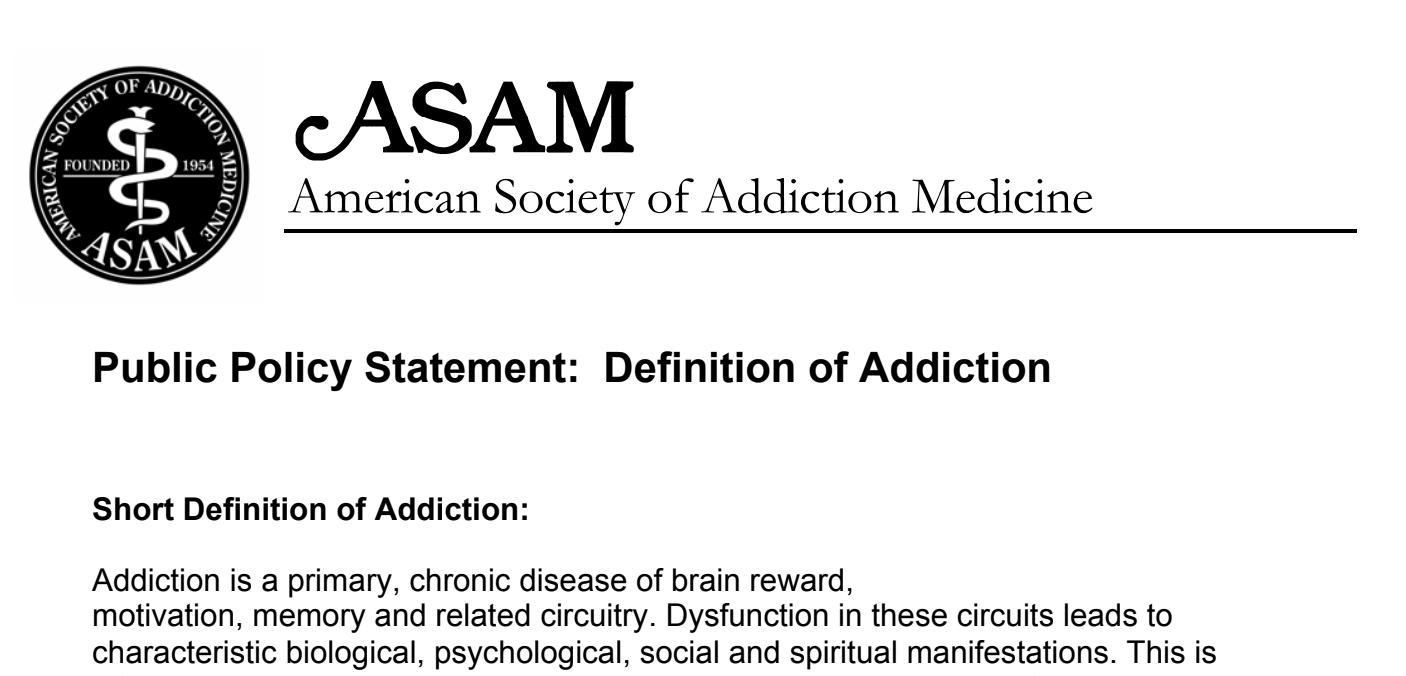
Get Informed
What is Addiction?
A.B.C.D.E Characterization
A. Inability to consistently Abstain
B. Impairment in Behavioural control
C. Craving; increased “hunger” for rewarding experiences
D. Diminished recognition of significant problems with one’s behaviours and interpersonal relationships
E. A dysfunctional Emotional response
Addiction is defined as a primary, chronic disease of brain reward, motivation, memory and related circuitry. Dysfunction in these circuits leads to characteristic biological, psychological, social and spiritual manifestations. This is reflected in an individual pathologically pursuing reward and/or relief by substance use and other behaviors.
Addiction is characterized by inability to consistently abstain, impairment in behavioral control, craving, diminished recognition of significant problems with one’s behaviors and interpersonal relationships, and a dysfunctional emotional response. Like other chronic diseases, addiction often involves cycles of relapse and remission. Without treatment or engagement in recovery activities, addiction is progressive and can result in disability or premature death.
American Society of Addiction Medicine (ASAM) Definition of Addiction - Adopted April 19, 2011.
Progressive and Fatal
As with most diseases, the degree of severity can vary from mild to severe. Take diabetes for example; a mild case of diabetes can be treated with a simple change in diet, less sugar and less sugary foods. A severe case will require insulin injections. The chart below is a visual representation of the severity of addiction in a person’s life, and the deviation from a person reaching his or her full potential.
The green line shows a theoretical linear progress to growth that a person without any form of addiction is likely to experience over the course of a normal 80 year life.
The purple line shows the most likely path of a person with a severe case of Addiction. Usually between the ages of 15 and 30 it becomes quit clear that they need to embrace a life of recovery or their life will end in premature death.
The red line shows the most likely path of a person with a moderate case of Addiction. Their ability to achieve their own personal human potential is limited by a moderate case of Addiction that will eventually manifest in a physical health condition, such as cancer, lung disease, kidney disease, diabetes, etc.
The yellow line shows the most likely path of a person with a mild case of Addiction. Generally, for most intents and purposes their lives go relatively well, without them ever knowing they didn’t reach their full individual human potential – the typical human experience. It is important to note that untreated mild Addiction can progress into moderate Addiction, rather quickly if there are more aggravating factors, and that untreated moderate Addiction can progress into severe Addiction, with aging and/or increasing or sudden life stressors.
Addiction is Addiction
The Disease of Addiction
Addiction is not limited to alcohol and illicit drugs. The brain cannot distinguish between substances and processes, all of which impact dopamine and other neurotransmitters in the brain.
Gambling
Food/Eating disorders
Sex, love, relationships
Internet/video games
Shopping
Exercise/sports
Work
Caffeine
Nicotine
Prescription medication
Symptoms Of Addiction
What is common among all types of addictions is the fact that they stem from a powerful chronic brain disease (an organ malfunction) that renders people powerless; regardless of the addictive behavior or “drug of choice”. It is not simply about stopping the behavior(s) or having personal choice - no one chooses to become addicted. Attempts to control it only aggravates symptoms.
There are common features that aid in identifying the root of problematic behaviors/substance use simply as Addiction. The dis-ease manifests not only among biological dimensions, but also across psychological, social and spiritual dimensions.
Addictive thinking
Dysfunctional brain circuitry
Reward, motivation and memory
Dysfunctional emotional response
Diminished recognition of problems
Craving to escape reality
Impairment of behavioral control
Inability to consistently abstain
Obsession and fantasy
Therefore, we use the phrase “Addiction is Addiction”
Recognizing Addiction
Common Mental Health Conditions:
Adjustment Disorders
Everyone encounters stress and difficulty in life. However, there may be times when a situation or series of events triggers an emotional reaction in someone that significantly impairs their functioning. Once the stressor(s) have alleviated, the symptoms will diminish within a few months. In such situations, it is not uncommon for people to think that they have a long-term mental health issue when, in reality, it is a shorter-term reaction to particular events.
Mood Disorders
This category includes conditions such as Depression, Bipolar Disorder, and Dysthymia. Symptoms may include periods of hopelessness, low mood, suicidal thoughts or self-harming behaviour, trouble with basic functions such as sleeping/eating, and difficulty performing the daily activities of life, such as attending work, self-care, etc.
How to Recognize a problem
Significant impairment in work/school, family, or close relationships is an obvious sign of difficulty. Other signs may include changes in sleeping/appetite, dramatic mood fluctuations, consistently unhealthy relationships, flashbacks/nightmares or racing thoughts. Having these symptoms does not necessarily mean that you have a diagnosable mental health condition, but may be a sign that you could benefit from professional consultation to help overcome current roadblocks you are facing.
Anxiety Disorders
Included within this category are Generalized Anxiety Disorder, Phobias, Obsessive-Compulsive Disorders, and Post-Traumatic Stress Disorder. People who live with anxiety may have: racing thoughts, difficulty concentrating or remembering things, physical symptoms (e.g., heart palpitations, panic attacks), intense fears, flashbacks, or repetitive behaviors/actions.
Other Conditions
Other mental health problems may include: addiction or substance abuse, trauma, learning disabilities, attention/concentration issues, chronic pain, relationship issues, stress management, communication, assertiveness, boundaries, and career exploration.
Grief and Loss
Coping with the loss of a loved one can be difficult and come with a variety of emotional and physical reactions, including, but not limited to, feelings of sadness, anger, denial, tearfulness, loss of appetite/sexual drive, isolation, and lack of enjoyment in normal activities. Given time, healthy self-care, and social/professional support these symptoms will typically lessen. Often having someone to process these feelings and experiences with can be helpful.





